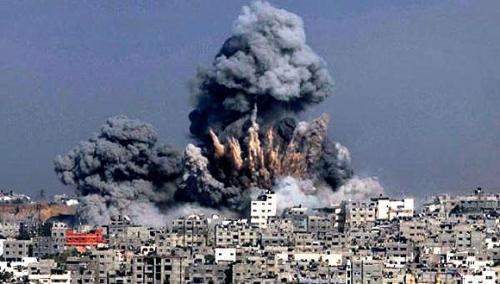Yankee worship of bombings and endless wars
- Opinión

“From Syria to Yemen in the Middle East, from Libya to Somalia in Africa, from Afghanistan to Pakistan in South Asia, all forming a U.S. air curtain descending on a huge swath of the planet with the declared goal of fighting terrorism. Its main method is summed up in surveillance, bombardments and more constant bombardments. Its political benefit is to minimize the number of “United States boots on the ground” and, therefore, American casualties in the never-ending war on terrorism, as well as public protests over Washington’s many conflicts. Its economic benefit: plenty of high-performance business for arms manufacturers for whom the president can now declare a national security emergency whenever he wants and sell his warplanes and ammunition to preferred dictatorships in the Middle East (no congressional approval required). Its reality for several foreign peoples: a sustained diet of bombs and missiles “Made in the USA” that explode here, there and everywhere.
This is how William J. Astore, a retired US Air Force lieutenant colonel and now a history professor, interprets the cult of bombing on a global scale that he views in his country, as well as the fact that U.S. wars are being fought more and more from the air, not on the ground, a reality that makes the prospect of ending them increasingly daunting, and finally asks: What is driving this process?
“For many of America’s decision-makers,” Astore says, “air power has clearly become a sort of abstraction.” After all, with the exception of the September 11 [2001] attacks by four hijacked commercial airliners, Americans have not been the target of such attacks since World War II. On the battlefields of Washington, the Greater Middle East and North Africa, air power is almost literally always a one-way street. There are no enemy air forces or significant air defenses. The skies are the exclusive property of the U.S. Air Force and its allies, so we are no longer talking about “war” in the normal sense. No wonder Washington’s politicians and military see it as our strength, our asymmetric advantage, our way of settling accounts with wrongdoers, real and imaginary.
It could be said that, in the 21st century, the count of bombs and missiles replaced the Vietnamese era body count as a metric of false progress. According to U.S. military data, Washington dropped no less than 26,172 bombs in seven countries in 2016, most of them in Iraq and Syria. Against Raqqa alone, the “capital of terrorists,” the United States and its allies dropped more than 20,000 bombs in 2017, reducing that provincial Syrian city literally to rubble. The Raqqqa bombing coupled with artillery fire killed more than 1,600 civilians, according to Amnesty International.
After Donald Trump took office as president, having promised to get the U.S. out of its endless wars, U.S. bombing has increased, not only against the Islamic state in Syria and Iraq, but also against Afghanistan. Civilian casualties increased even when “friendly” Afghan forces have been mistaken for “enemies” and also liquidated.
Somalia’s air strikes on Yemen have also been on the rise under Trump, while civilian casualties due to U.S. bombings continue to be underestimated by the U.S. media and minimized by the Trump administration.
This country’s propensity to believe that its ability to rain infernal fire from the sky provides it with a winning methodology for its wars has proven to be a fantasy of our age. Whether in Korea in the early 1950s, in Vietnam in the 1960s, or more recently in Afghanistan, Iraq, and Syria, the United States can control the air, but that dominance simply has not led to ultimate success. In the case of Afghanistan, weapons such as the Mother of All Bombs (MOAB, the most powerful non-nuclear bomb in the U.S. military arsenal) have been celebrated as game changers even when they changed nothing. (In fact, the Taliban only continue to strengthen, as does the branch of the Islamic state in Afghanistan.) As is often the case when it comes to U.S. air power, such destruction leads neither to victory nor to the closure of anything; only to even greater destruction.
“Such results are contrary to the logic of air power that I absorbed in my career in the U.S. Air Force, from which I retired in 2005,” says Professor William J. Astore.
June 19, 2019.
- Manuel E. Yepe
http://manuelyepe.wordpress.com/
(Translated and edited by Walter Lippmann.)
This article may be reproduced by quoting the newspaper POR ESTO as the source.
Del mismo autor
- ¿Por qué la sostenida popularidad de Trump? 20/07/2020
- Ya no es la economía, estúpido, es el virus 15/07/2020
- De qué no será capaz Trump para reelegirse 02/06/2020
- The Capitalist Crisis is Worse than Covid-19 26/05/2020
- Refutación del fundamentalismo religioso 19/05/2020
- Precedents in Cuba of “Operation Gideon” 16/05/2020
- Precedentes en Cuba de la Operación Gedeón 14/05/2020
- Los grandes perdedores del Super Bowl 18/02/2020
- El papel del miedo en las elecciones de EEUU 11/02/2020
- Impacto de Trump en la juventud de EEUU 24/01/2020
Clasificado en
Clasificado en:
Guerra y Paz
- Prabir Purkayastha 08/04/2022
- Prabir Purkayastha 08/04/2022
- Adolfo Pérez Esquivel 06/04/2022
- Adolfo Pérez Esquivel 05/04/2022
- Vijay Prashad 04/04/2022








